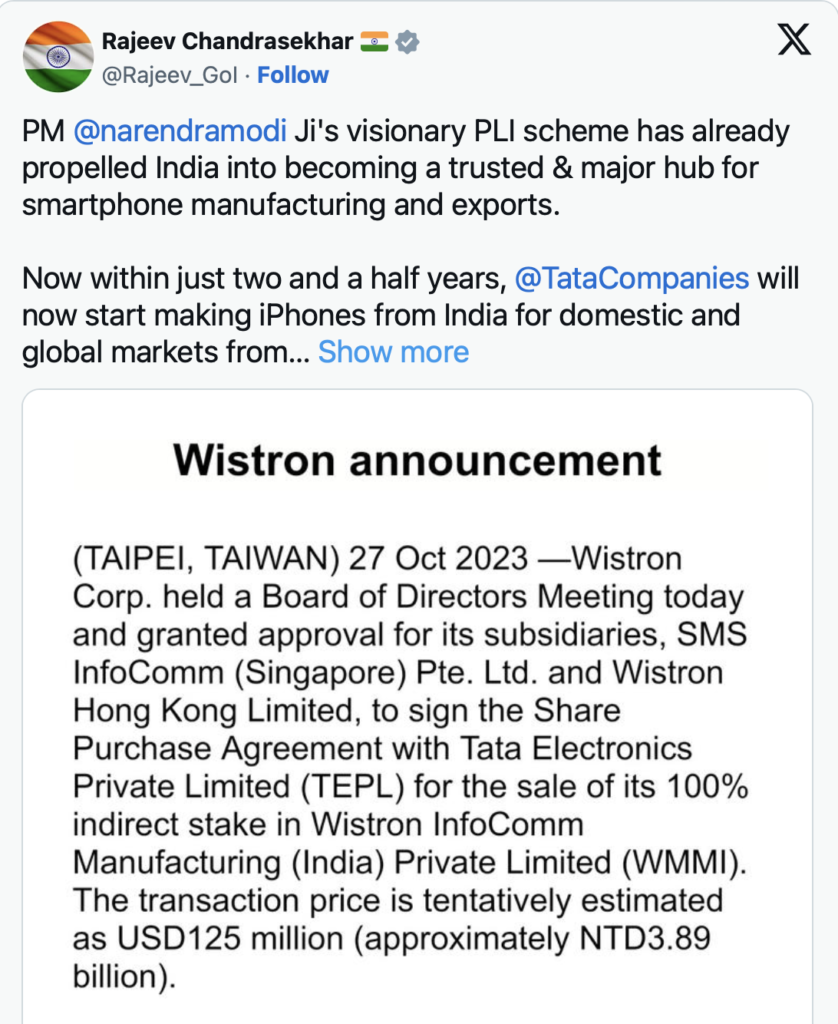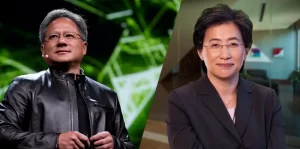Introduction
In a significant development for the technology and electronics industry, Tata Group is set to commence the production of iPhone in India, serving both domestic and global markets.
This move follows Tata’s takeover of Wistron’s operations, marking a remarkable milestone in India’s journey towards becoming a global electronics manufacturing hub.
The announcement was made by Union Minister of State for Electronics & Technology, Rajeev Chandrasekhar, through a social networking platform on October 27, 2023.
Tata’s Entry into iPhone Production
On October 27, Union Minister Rajeev Chandrasekhar announced the exciting news that Tata Companies would begin producing iPhones in India within just two and a half years. This development is significant for several reasons and has garnered widespread attention in the tech industry.
Domestic and Global Reach: Tata’s entry into iPhone production signifies a dual focus on both domestic and global markets. This aligns with the Indian government’s “Make in India” initiative, promoting local manufacturing while also capitalizing on India’s vast consumer base and cost-effective production capabilities.
Tata-Wistron Takeover: Tata’s involvement in iPhone production comes on the heels of its takeover of Wistron’s operations.
Wistron Corp. approved the sale of its subsidiaries, SMS InfoComm (Singapore) Pte. Ltd. and Wistron Hong Kong Limited, to Tata Electronics Private Limited (TEPL). The preliminary estimated transaction price stands at approximately $125 million.
Apple’s Expanding Global Supply Chain: Apple’s decision to collaborate with Tata Group to manufacture iPhones in India reflects the company’s efforts to diversify its supply chain beyond China.
This strategic move is not only significant for Apple but also for the Indian electronics industry as a whole.
Indian Government’s Support: The Ministry of Electronics & Information Technology has expressed its support for the growth of global Indian electronics companies.
This move aims to attract international electronics brands looking to make India their trusted manufacturing and talent partner, aligning with the Indian government’s vision to position the country as a global electronics power.
Read More: What is the Progress of Semiconductor Ecosystem in India in Last 2 years?

What is Wistron & how will Tata make use of the facility?
Wistron is a Taiwanese multinational corporation that primarily engages in the manufacturing of electronics, including smartphones, laptops, and other consumer electronics. They have been a key manufacturer for Apple, producing various iPhone models in the past.
Tata’s use of Wistron’s facility involves taking over the operations to produce iPhones in India. Tata Group’s involvement in iPhone production will likely encompass managing the manufacturing process, quality control, assembly, and supply chain operations for Apple’s iPhones. This move aligns with the “Make in India” initiative and aims to capitalize on India’s manufacturing potential to meet both domestic and global demand for iPhones. Tata will leverage the existing infrastructure and expertise at the Wistron facility to ensure the efficient production and delivery of Apple’s products.
Impact and Implications
The entry of Tata Group into iPhone production in India carries several implications and potential benefits:
Strengthening India’s Manufacturing Capabilities:
India’s electronics manufacturing industry has been growing steadily, and the involvement of a conglomerate like Tata is expected to further boost the country’s manufacturing capabilities.
This not only brings investment but also creates job opportunities and technology transfer.
Diversifying Apple’s Supply Chain:
Apple’s reliance on China for manufacturing has been a concern due to geopolitical and supply chain disruptions.
Producing iPhones in India helps diversify its supply chain and reduce risks associated with overreliance on a single manufacturing base.
Boosting India’s Export Potential:
With Tata producing iPhones for global markets, this move has the potential to significantly boost India’s electronics export capabilities. This will contribute to the country’s economy.
Attracting Global Tech Brands:
India’s growing reputation as a hub for electronics manufacturing and innovation is likely to attract more global tech brands. This further strengthens the country’s position in the global tech landscape.
Read More: Why India is Paying for 70% of Micron’s ATMP Plant, Even Though Micron Owns It 100%
Conclusion
The announcement of Tata Group’s entry into iPhone production in India is a momentous step for the Indian electronics industry. It reflects the convergence of government initiatives, corporate strategy, and global market dynamics.
This partnership could redefine the global electronics supply chain, positioning India as a key player in technology manufacturing.
The tech industry is closely monitoring the progress as the transaction advances and agreements are settled.




